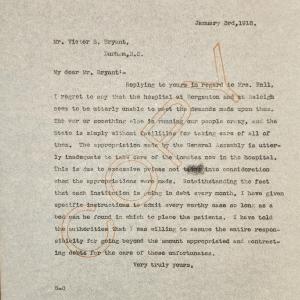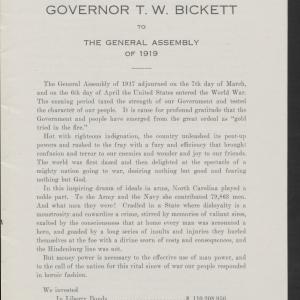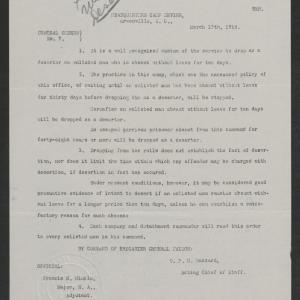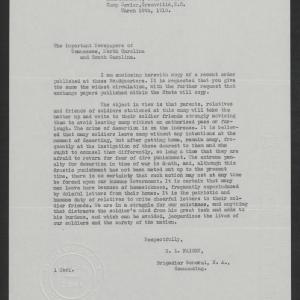- Transcription
No 4.
War Department-Official Business.
Raleigh, N.C., May 31, 1917.
Provost Marshal General,
Washington, D.C.
I cannot escape the conviction that a wise and fair selection of the men who are to be first called from those drafted for service is simply impossible unless there is at least one man from each county to advise the judicial district boards in regard to the actual facts and conditions. The determining facts will not appear on the registration cards. In public speeches all over the state and in the press I have proclaimed that the men first called would be those who have the least to do at home. For instance I have in mind one man who has three sons none of whom will be legally exempt from service. Two of these sons are doing good work at home, and it would be a hardship on the father and on the community for them to be taken away. The third son while he pretends to work, practically does nothing, and it would be a blessing to his family and to the commumunity for his to be drafted into the army. A district board could not possibly know these conditions. The registration cards would show the same facts in regard to all three. This particular case is multiplied by thousands in North Carolina. If the men who are charged with the selection of those who are to be first called could know the actual facts the entire quota from North Carolina could be made up without imposing any hardship upon individuals or upon communities. The big argument in favor of the law was that judgment was to be used in the selection of those drafted. This judgment cannot be exercised unless those who do the selecting know the facts and it is impossible for a judicial district board to know the facts unless they call to their assistance disinterested and patriotic men from each county. You will, pardon me for being so emphatic, but I think that no Governor in the South made a harder fight for the selective draft law than I did. I still believe that it is a wise and just law, but the selective part of the law is infinitely more important than the drafting part of it. It would be a horrible blunder to simply draw the requisite number for the first call from these not exempt. It is my purpose, in so far as I am permitted, to have anything to do with the matter, to call quitters in the industrial world to the colors first. I earnestly urge that in making the regulations ample provision be made for taking care of this phase of the situation. The permanent popularity and existence of the law depends upon this being done. After mature reflection I am driven back to my original opinion that it is unwise to name county officials on country registration boards. Politics is the life breath of these officials, and in some of the counties they are violently opposed to the whole law and will be disposed to make every exemption possible. At the expense of postponing for a week the appointment of local exemption boards I think it would be wise and result in infinitely more satisfactory administration of the law for disinterested patriotic citizens who are free from political considerations to serve on these local boards. My interpretation of the law is that this is entirely permissible.
T. W. Bickett,
Governor.
(Charge to Federal Government).
Date:
Sender:
Recipient:
Repository:
Collection:
Places:
»» »» Washington, D.C.







